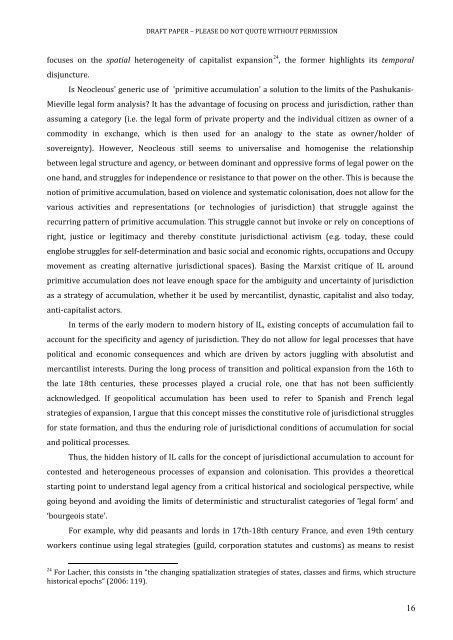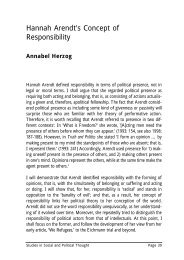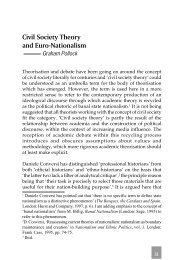Historical Materialism and International Law - University of Sussex
Historical Materialism and International Law - University of Sussex
Historical Materialism and International Law - University of Sussex
Create successful ePaper yourself
Turn your PDF publications into a flip-book with our unique Google optimized e-Paper software.
DRAFT PAPER – PLEASE DO NOT QUOTE WITHOUT PERMISSION<br />
focuses on the spatial heterogeneity <strong>of</strong> capitalist expansion 24 , the former highlights its temporal<br />
disjuncture.<br />
Is Neocleous' generic use <strong>of</strong> 'primitive accumulation' a solution to the limits <strong>of</strong> the Pashukanis-<br />
Mieville legal form analysis? It has the advantage <strong>of</strong> focusing on process <strong>and</strong> jurisdiction, rather than<br />
assuming a category (i.e. the legal form <strong>of</strong> private property <strong>and</strong> the individual citizen as owner <strong>of</strong> a<br />
commodity in exchange, which is then used for an analogy to the state as owner/holder <strong>of</strong><br />
sovereignty). However, Neocleous still seems to universalise <strong>and</strong> homogenise the relationship<br />
between legal structure <strong>and</strong> agency, or between dominant <strong>and</strong> oppressive forms <strong>of</strong> legal power on the<br />
one h<strong>and</strong>, <strong>and</strong> struggles for independence or resistance to that power on the other. This is because the<br />
notion <strong>of</strong> primitive accumulation, based on violence <strong>and</strong> systematic colonisation, does not allow for the<br />
various activities <strong>and</strong> representations (or technologies <strong>of</strong> jurisdiction) that struggle against the<br />
recurring pattern <strong>of</strong> primitive accumulation. This struggle cannot but invoke or rely on conceptions <strong>of</strong><br />
right, justice or legitimacy <strong>and</strong> thereby constitute jurisdictional activism (e.g. today, these could<br />
englobe struggles for self-determination <strong>and</strong> basic social <strong>and</strong> economic rights, occupations <strong>and</strong> Occupy<br />
movement as creating alternative jurisdictional spaces). Basing the Marxist critique <strong>of</strong> IL around<br />
primitive accumulation does not leave enough space for the ambiguity <strong>and</strong> uncertainty <strong>of</strong> jurisdiction<br />
as a strategy <strong>of</strong> accumulation, whether it be used by mercantilist, dynastic, capitalist <strong>and</strong> also today,<br />
anti-capitalist actors.<br />
In terms <strong>of</strong> the early modern to modern history <strong>of</strong> IL, existing concepts <strong>of</strong> accumulation fail to<br />
account for the specificity <strong>and</strong> agency <strong>of</strong> jurisdiction. They do not allow for legal processes that have<br />
political <strong>and</strong> economic consequences <strong>and</strong> which are driven by actors juggling with absolutist <strong>and</strong><br />
mercantilist interests. During the long process <strong>of</strong> transition <strong>and</strong> political expansion from the 16th to<br />
the late 18th centuries, these processes played a crucial role, one that has not been sufficiently<br />
acknowledged. If geopolitical accumulation has been used to refer to Spanish <strong>and</strong> French legal<br />
strategies <strong>of</strong> expansion, I argue that this concept misses the constitutive role <strong>of</strong> jurisdictional struggles<br />
for state formation, <strong>and</strong> thus the enduring role <strong>of</strong> jurisdictional conditions <strong>of</strong> accumulation for social<br />
<strong>and</strong> political processes.<br />
Thus, the hidden history <strong>of</strong> IL calls for the concept <strong>of</strong> jurisdictional accumulation to account for<br />
contested <strong>and</strong> heterogeneous processes <strong>of</strong> expansion <strong>and</strong> colonisation. This provides a theoretical<br />
starting point to underst<strong>and</strong> legal agency from a critical historical <strong>and</strong> sociological perspective, while<br />
going beyond <strong>and</strong> avoiding the limits <strong>of</strong> deterministic <strong>and</strong> structuralist categories <strong>of</strong> ‘legal form’ <strong>and</strong><br />
‘bourgeois state’.<br />
For example, why did peasants <strong>and</strong> lords in 17th-18th century France, <strong>and</strong> even 19th century<br />
workers continue using legal strategies (guild, corporation statutes <strong>and</strong> customs) as means to resist<br />
24 For Lacher, this consists in “the changing spatialization strategies <strong>of</strong> states, classes <strong>and</strong> firms, which structure<br />
historical epochs” (2006: 119).<br />
16
















